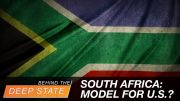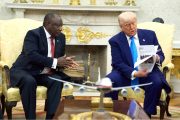In a referendum on Southern independence held in January — widely criticized by communists, islamists and the ruling Sudanese dictatorship in Khartoum — almost 99 percent of voters in the South voted in favor of secession from the North. The election was the product of a 2005 agreement stemming from the most recent 20-year civil war.
At first, the dictatorship in the North was hesitant to honor the results. But Northern President Omar Bashir — wanted by the International Criminal Court for war crimes and dubbed the head of a “state sponsor of terror” by the U.S. government — appears to have reluctantly agreed to permit independence. He even attended the weekend ceremony in the new Southern capital of Juba.
But already, leaders in the South — predominantly Christian and various tribal religions — are accusing the Islamic regime to the North of stirring up unrest and rebellion in the new nation. And there are still many issues unresolved that could erupt at any time. Most contentious among them: how to divide up the oil money from the Abyei region that straddles the new border between the two countries.
And while the Northern dictatorship is well known for its ghastly crimes — genocide in Darfur, persecution and systematic rape of non-Muslims, and more — officials in the South were being widely criticized for corruption and other problems before South Sudan was even officially born. Most of them are former rebel commanders who fought in various civil wars against the North.
In an interview with the Los Angeles Times, Nhial Bol, a local newspaper editor in the South dedicated to exposing corruption, blasted the new Southern government. He said he had been arrested three times in recent years for criticizing officials, including once again just last month.
"People like our leaders have not been challenged in their life," he told the Times. "Now, if you ask, 'What did you do with the money?' he won't like it." Among the stories his paper has covered recently is one about money being handed to the military without proper accounting. "The corruption here is very high because the culture of war has been institutionalized."
And corruption is far from the only problem. According to United Nations statistics cited in news reports, more than 90 percent of the South Sudanese population lives on less than $1 a day. Almost 20 percent are chronically hungry and most people do not have access to safe drinking water. What passes for the “economy” consists mostly of subsistence farming.
The Sudan was ruled by the British and Egyptian governments until the mid-1950s. Civil war has been the norm since then. Millions were killed in the decades following independence after the Soviet and Chinese communist dictatorships backed various murderous central governments. The warfare and statism destroyed what little infrastructure there may have been.
Among the main points of conflict over the years were Islamic and socialist regimes in Khartoum attempting to dominate and crush their opposition through central planning and Sharia law. The results have been a disaster.
Estimates on the current population of South Sudan vary, but the U.S. State Department puts the figure somewhere in the neighborhood of eight million. Very few can read or write.
But while the Northern government is reportedly taking the opportunity to step up its suppression of dissent, the new Southern President, Salva Kiir Mayardit, is publicly calling for peace and prosperity in the South. "I want to offer public amnesty to all those who took arms against the people of South Sudan,” Kiir, a Catholic, said in a recent radio broadcast. “Let them lay down these arms and help us in building this new nation."
Kiir also has high hopes for the future. "We dream of South Sudan where children go to school with no fear of air bombardments,” he said. “We dream of South Sudan where every house has access to electricity and clean water. We dream of South Sudan where every family has sufficient food."
The new government has not been formally accepted into the UN yet, but the international body is widely expected to vote on a resolution welcoming the Republic of South Sudan into the General Assembly. The Security Council will take up the matter later this week.
South Sudan is easily one of the most troubled nations in the world despite the fact that it came into existence only a few days ago. But if the people can succeed in permanently throwing off the Northern chains, analysts say the new republic will be in a much better position to develop and prosper in the coming years.
Photo of South Sudan flag: AP Images




